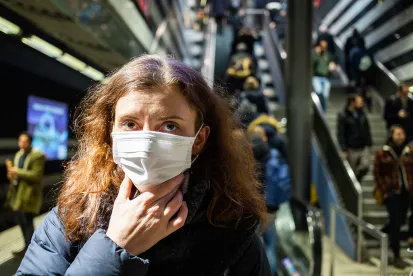On March 18, 2020, the President signed into law the Families First Coronavirus Response Act, H.R. 6201, Pub. L. No. 116-127 (the “Coronavirus Response Act”). Among other measures in response to the current pandemic, this legislation offers manufacturers and distributors of industrial-grade face masks, referred to as “personal respiratory protective devices,” immunity from liability arising from use of the masks in connection with COVID-19. This immunity is retroactive to January 27, 2020, will last through October 1, 2024, and stems from the Federal Government’s effort to respond to the shortage of available masks. The law follows the Food & Drug Administration’s Emergency Use Authorization for emergency use of industrial-grade face masks in health care settings on March 2, 2020.

Demand for face masks understandably is high in both the commercial and government marketplaces, with the recent surge of orders through the Defense Priorities and Allocations System, GSA’s cooperative purchasing programs, and even direct outreach from Federal officials. Vendors selling on a Federal Supply Schedule likely have seen increased demand from state and local government purchasers as well, who currently are able to buy through the Schedules program pursuant to the January 2020 declaration of a Public Health Emergency by HHS, and the subsequent March declaration of a Stafford Act national emergency by the President. The Coronavirus Response Act should give commercial manufacturers and distributors of face masks at least some additional protection as they ramp up production to help combat the COVID-19.
The Coronavirus Response Act amends section (i)(1) of the Public Health Service (“PHS”) Act, 42 U.S.C. § 247d–6d, which already provides targeted liability protections for pandemic and epidemic products and security countermeasures. This immunity sometimes is called Public Readiness and Emergency Preparedness (“PREP”) Act immunity, named for the legislation that added these protections to the PHS Act. The PHS Act generally limits manufacturers’ and others’ liability for loss resulting from the use of certain products, drugs, and security countermeasures in response to pandemic or epidemic situations like the one currently facing the global community.
Similar to the SAFETY Act, which protects developers of anti-terrorism technology from liability for harm from terrorism, and Public Law 85-804, which limits liability for contractors performing unusually hazardous or nuclear government contracts, the idea behind PREP Act immunity is to incentivize manufacturers, distributors, and other covered people to develop, manufacture, distribute and implement emergency countermeasures to combat public health crises like the current COVID-19 pandemic. The legislation protects covered parties from liability for physical, mental, or emotional injury, fear of injury, and even death, resulting from the use of face masks as a countermeasure to the COVID-19 pandemic. The protection does not apply to willful misconduct, which includes acting in disregard of obvious risks. To activate these protections, the Secretary of the Department of Health and Human Services (“Secretary”) must make a special PREP Act declaration—different from a general PHE declaration—declaring a public health emergency and indicating which countermeasures will be covered by the liability protections, along with other pertinent information.
The Secretary issued the required PREP Act declaration regarding COVID-19 with an effective date of February 4, 2020. The declaration activated the liability protections for a wide array of health care-related entities, including those performing Federal Government contracts, for various products during the outbreak. The protections will apply not only to the manufacturers and distributors of covered countermeasures, but also any person authorized to prescribe, administer, deliver, distribute, or dispense those countermeasures. Covered countermeasures include any antiviral or other drug, biologic, diagnostic, device, or vaccine, in addition to face masks, used in response to COVID-19.
As you are aware, things are changing quickly and there is no clear-cut authority or bright line rules in this area. Our blog does not reflect an unequivocal statement of the law, but instead represents our best understanding of where things currently stand. Further, this blog does not address the potential impacts of the numerous other local, state and federal orders that have been issued in response to the COVID-19 pandemic, including, without limitation, potential liability should an employee become ill, requirements regarding family leave, sick pay and other issues.




 />i
/>i

